Lusitania Torpedoed 100 Years Ago Today
May 6, 2015
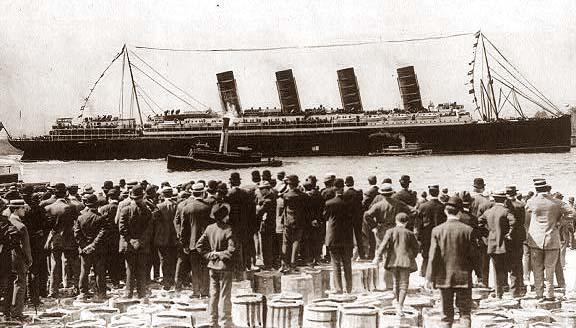 (left. the 32,000 ton Lusitania, sunk May 7, 1915)
(left. the 32,000 ton Lusitania, sunk May 7, 1915) The Lusitania was the world's largest ocean liner in 1915.
Its sinking swayed American opinion in favor of entering
World War One. As such, it was a combination of Pearl Harbor
and 9-11. The evidence suggests an explosion and not a torpedo
caused the ship to sink in 18 minutes.
The Illuminati happily sacrifice Christians to advance the cause of war and world government. 1200 passengers and crew, including 128 Americans, were drowned.
by James Perloff
(henrymakow.com)
America's involvement in World War One, like so many others, was engineered through a false flag.
In 1915, Britain was at war with Germany, but the U.S. was still neutral. On May 7, the Lusitania, a British ocean liner en route from America to England, was sunk by a U-boat. 128 Americans were among the dead. The 32,000-ton ship went down in just 18 minutes after a single torpedo hit.
Survivors reported two explosions - a smaller one followed by an enormous one. The tragedy was publicly portrayed as wanton slaughter, and was the most important in a series of pretexts used to generate the eventual U.S. declaration of war.
Lusitania facts:
• Germany's U-boat campaign against British shipping was in retaliation for Britain's naval blockade of Germany, which ultimately caused hundreds of thousands to die of starvation.
• U-boats initially observed "Cruiser Rules" established under international law: before sinking a merchant vessel, they would surface, and allow the ship's crew to evacuate in lifeboats.
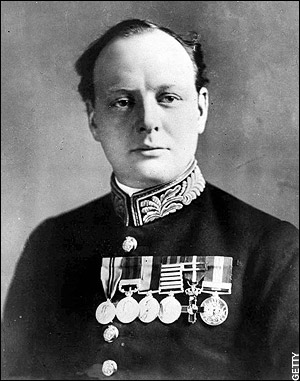 • They abandoned this policy because Winston Churchill, head of the British Admiralty, unilaterally revoked the "Cruiser Rules." He ordered merchant ships armed. Colin Simpson writes: "It was made an offence to obey a U-boat's orders to halt. Instead masters must immediately engage the enemy, either with their armament if they possessed it, or by ramming if they did not. Any master who surrendered his ship was to be prosecuted, and several were."
• They abandoned this policy because Winston Churchill, head of the British Admiralty, unilaterally revoked the "Cruiser Rules." He ordered merchant ships armed. Colin Simpson writes: "It was made an offence to obey a U-boat's orders to halt. Instead masters must immediately engage the enemy, either with their armament if they possessed it, or by ramming if they did not. Any master who surrendered his ship was to be prosecuted, and several were."• One low-caliber cannon shot could sink a U-boat. After merchantmen sank several U-boats, they stopped surfacing and resorted to unannounced torpedo attacks.
• Churchill said: It was "most important to attract neutral shipping to our shores, in the hope especially of embroiling the United States with Germany."
..."The maneuver which brings an ally into the field is as serviceable as that which wins a great battle." ..."As the U-boats were forced by the progressive arming of the British Mercantile Marine to rely increasingly on under-water attacks, they . . . ran the greatest risk of mistaking neutral for British vessels . . . and thus of embroiling Germany with other great Powers."
• To Churchill's disappointment, U-boats avoided attacking American ships. The next option, therefore, was a British ship sunk with Americans aboard. Churchill had Naval Intelligence submit a report on what the political results would be of such a sinking.
• The Lusitania was a legitimate target. Not only had the Admiralty outfitted her for guns - Jane's Fighting Ships listed her as an auxiliary cruiser - she was used to ferry munitions. On her final voyage she carried 6 million rifle cartridges, over 50 tons of shrapnel shells, and various explosives.
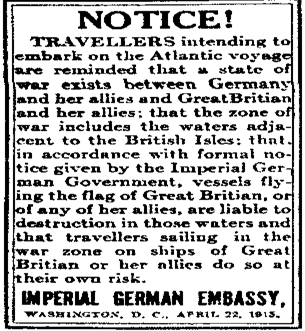 • The Germans tried to prevent Americans from boarding her by placing a warning in newspapers near sailing notices. Publication was delayed on orders of a State Department officer.
• The Germans tried to prevent Americans from boarding her by placing a warning in newspapers near sailing notices. Publication was delayed on orders of a State Department officer.• Britain's Admiralty knew the U-20 (which sank the Lusitania) was in the Irish Sea, from reports of the sub's activities and decoded naval intercepts.
• Five days before the tragedy, Walter Hines Page, U.S. ambassador to England, wrote his son: "If a British liner full of American passengers be blown up, what will Uncle Sam do? That's what's going to happen."
• Edward Mandell House, Woodrow Wilson's notorious controller, was in England then as the President's emissary. Just hours before the Lusitania went down, he met with Edward Grey, Britain's foreign minister. House recorded: "We spoke of the probability of an ocean liner being sunk, and I told him if this were done, a flame of indignation would sweep across America, which would in itself probably carry us into the war."
House and Grey then proceeded to Buckingham Palace to meet George V. House wrote: "He [the king] said, 'Suppose they should sink the Lusitania, with American passengers on board?'"
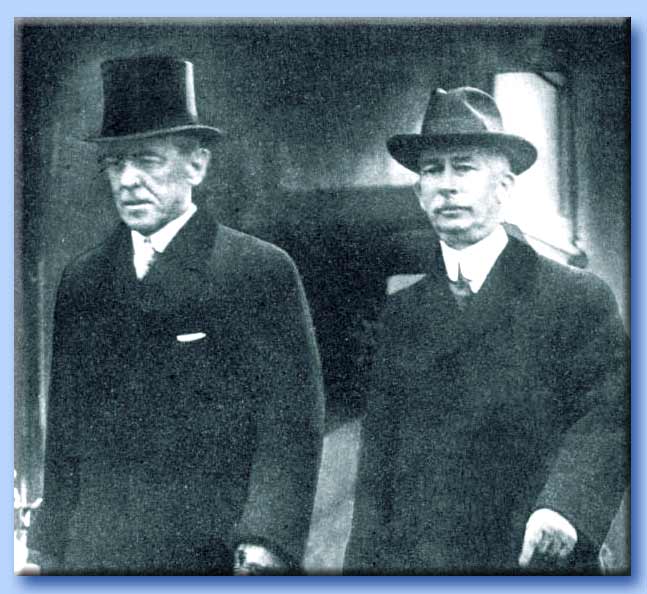 (Woodrow Wilson, and his handler Edward House)
(Woodrow Wilson, and his handler Edward House)• On previous voyages, destroyers had accompanied the Lusitania where submarine threats existed. On May 7, however, no destroyers were sent, though four lay idle in the nearby port of Milford Haven, and despite the U-20's known presence (it had sunk two steamers the previous day).
• Patrick Beesly was considered the leading authority on the history of British Naval Intelligence, in which he was long an officer. In his book Room 40, Beesly wrote: "Nothing, absolutely nothing was done to ensure the liner's safe arrival . . . . I am reluctantly driven to the conclusion that there was a conspiracy deliberately to put the Lusitania at risk in the hopes that even an abortive attack on her would bring the United States into the war. Such a conspiracy could not have been put into effect without Winston Churchill's express permission and approval."
• After the torpedo struck, the enormous second explosion which sank the ship originated where her munitions were stored. The Lusitania carried explosives: 46 tons of aluminum powder, some 4,000 containers of gun cotton, and 18 containers of percussion fuses.
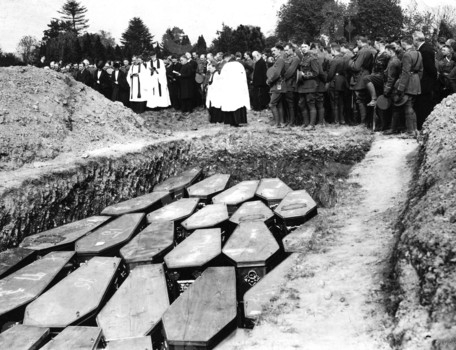 • Hundreds of bodies washed up on the Irish shore. The Admiralty issued an order "to ensure that bodies selected for the inquest had not been killed or mutilated by means which we do not wish to be made public."
• Hundreds of bodies washed up on the Irish shore. The Admiralty issued an order "to ensure that bodies selected for the inquest had not been killed or mutilated by means which we do not wish to be made public."• A formal inquiry was held before Lord Mersey, who also oversaw the Titanic inquiry. However, before it got underway, the Admiralty resolved to scapegoat the ship's captain, William Turner.
Admiral Lord Fisher wrote: "I feel absolutely certain that Captain Turner of the Lusitania is a scoundrel and been bribed. . . .I hope that Captain Turner will be arrested immediately after the inquiry, whatever the verdict or finding may be . . . . Ought not Lord Mersey to get a hint?"
Churchill responded that "we shall pursue the Captain without check." Richard Webb of the Admiralty's Trade Division wrote Mersey: "I am directed by the Board of Admiralty to inform you that it is considered politically expedient that Captain Turner the master of the Lusitania be most prominently blamed for the disaster."
• At the inquiry, Mersey quashed all evidence of the Lusitania's contraband munitions. However, he was unwilling to crucify Turner: No substantive evidence was produced incriminating this veteran seaman, and by the time of the verdict, Churchill had been sacked from the Admiralty due to the disastrous Dardanelles campaign, so there was no longer any need to placate him. Mersey later said: "The Lusitania case was a damned dirty business."
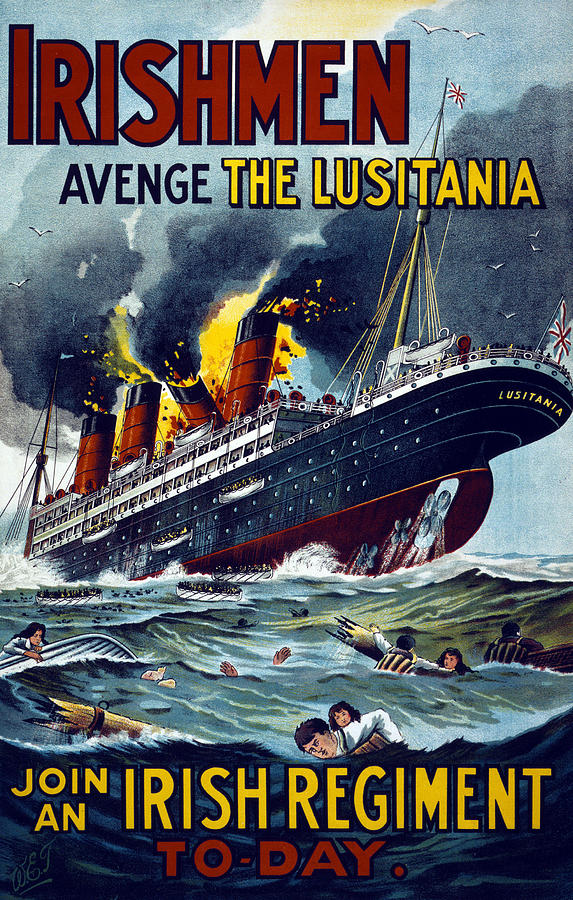 • The Illuminati intended the Lusitania disaster to produce a U.S. declaration war, but they had overestimated the American people's pliability (just as when Obama sought air strikes on Syria over alleged chemical weapons use).
• The Illuminati intended the Lusitania disaster to produce a U.S. declaration war, but they had overestimated the American people's pliability (just as when Obama sought air strikes on Syria over alleged chemical weapons use). Woodrow Wilson therefore had to engage in a series of diplomatic jousts with Germany while the media built up "German invasion hysteria" and the banksters brought both parties in line.
Wilson finally got his war declaration, claiming Germany had broken its pledge to refrain from unrestricted submarine warfare, ignoring that Germany's pledge had been conditional on Britain's reciprocally observing international law - which the British government had refused to do.
-------
For the full story of the Lusitania, Wilson, and how World War I benefited the Illuminati, see the author's footnoted online article.
James Perloff is author of several books; his latest is Truth Is a Lonely Warrior.
Related- T. Stokes says the Lusitania was sabotaged from within
First Comment by Joe Spickard







Adam said (May 6, 2015):
I still marvel at how "Blessed are the peacemakers" could be misinterpreted as "Blessed are the warmongers" by the average person who falls for these connivances.
I wonder how 'they' will commemorate the success of the Lusitania.